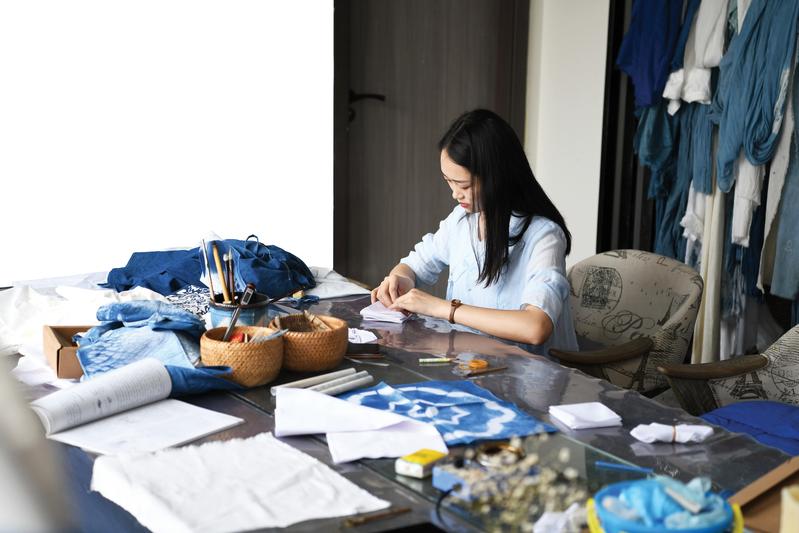 A yarn-dye workshop offers visitors a close look at the traditional craft. (WANG XI / XINHUA)
A yarn-dye workshop offers visitors a close look at the traditional craft. (WANG XI / XINHUA)
Businesswoman Hu Rong wanted a countryside getaway for weekends. In 2012, she looked at many places in Sichuan province and was impressed by the view of Gaohuai village, which is on the outskirts of Deyang city. She soon decided to rent a house there.
Then she decorated the house, planted flowers and vegetables in her garden and invited friends over at weekends. Gradually, the house attracted more people from the city, and Hu built it into a shared house that enabled many families to take turns and use it on weekends.
Hu decided to open a cafe there in 2014 to receive people who lived in the city and wanted to take a break in the countryside. “The cafe is called Buyuan, which means ‘not far’ in Chinese. Literally, the cafe is not far from Deyang city, where people who drive a car can reach it in minutes. It also means we are not far from the life we imagine we can live as long as we are determined to realize our dreams,” said Hu.
Back then she did not think the cafe would lead to many changes in the village. But it promoted the growth of cultural and creative activities in the village several years later. Since Buyuan was set up, another 22 cafes were opened in the village, giving it a new nickname — “coffee village”.
“Our village has a location advantage since it is close to Deyang city. Many people arrive in the village for outdoor sports like cycling. Then they like to have some drinks, and our cafes just meet that demand,” said He Jian, a local official.
The village engaged Beijing-based service provider SYN Architects that is working on rural revitalization and plans to turn Gaohuai into a cultural and creative spot, where visitors can enjoy a “colorful and peaceful rural life”.
The local government has invested 21 million yuan (US$3 million) to improve infrastructure and sewage disposal. The village also invested 1.27 million yuan in land consolidation and building homestays. The plan attracted 27 enterprises to invest 79.5 million yuan to bring in more business to the village.
After several years’ development, the village now has 37 cultural businesses, including bookstores, intangible cultural heritage inheritors’ studios, yarn-dye workshops and homestays. “They not only attract many visitors but also improve many local people’s lives,” He said.
Some local people who had left the village for jobs are now returning to work with cultural-business startups, He added.
After hearing of Gaohuai’s plan to develop cultural and creative businesses, native Guan Yong, who had worked as a hairdresser in Deyang city for 21 years, returned to his hometown and opened a cafe in 2018.
“When I was young, I wanted to leave my hometown since it was too poor and lacked infrastructure, and we lived in dilapidated houses,” Guan recalled. When Guan graduated from junior high school at age 19 in 1997, he left for the city.
A few years ago, Guan noticed Gaohuai was working to develop cultural businesses.
“Some of Gaohuai’s cultural businesses are well managed, with government support, so I believed returning home to start a business would be a reliable option for me.”
Guan received a 10,000 yuan government grant for his cafe, and some training on making coffee, arranging flowers and running a homestay. He invested 1.8 million yuan to build a cafe on his family’s land, and he and his wife Liu Xuemei decorated it.
Liu said the cafe did not make much money at first. But now it brings in over 300,000 yuan a year.
“About 80 percent of our guests are city dwellers. They often live busy lives and come here for relaxation during holidays,” Liu said.
Guan has hired three other locals to help at the cafe.
With the development of the village, “we live a better life without having to go far from home”, he said.
Over the years, more local people have joined the trend.
Lin Ying, a Gaohuai resident, said her family was poor and her mother-in-law is sick. Lin and her husband tried various jobs like growing and selling vegetables, raising fish and rabbits and working at factories. After four years, they improved their condition and came out of poverty.
In 2017, Lin decided to reconstruct her own house into a three-floor teahouse for customers to enjoy tea, pick vegetables and fruit in the garden and enjoy home-cooked meals.
“My house is close to hills and a river, so visitors can enjoy the beautiful natural views. This is the advantage of our restaurant,” said Lin.
Now, she can earn nearly 10,000 yuan per month.
According to He, the trend can benefit villagers. “They can earn money by renting their houses and land to those who want to start businesses or find jobs in cultural companies.”
More than 300 people are engaged in cultural businesses in Gaohuai.
“Gaohuai has become a good example of rural revitalization. It can receive about 500,000 visitors a year, generating up to 20 million yuan,” said He.
In 2017, the village was honored as one of the “beautiful and habitable villages in China” by the Ministry of Housing and Urban-Rural Development.


